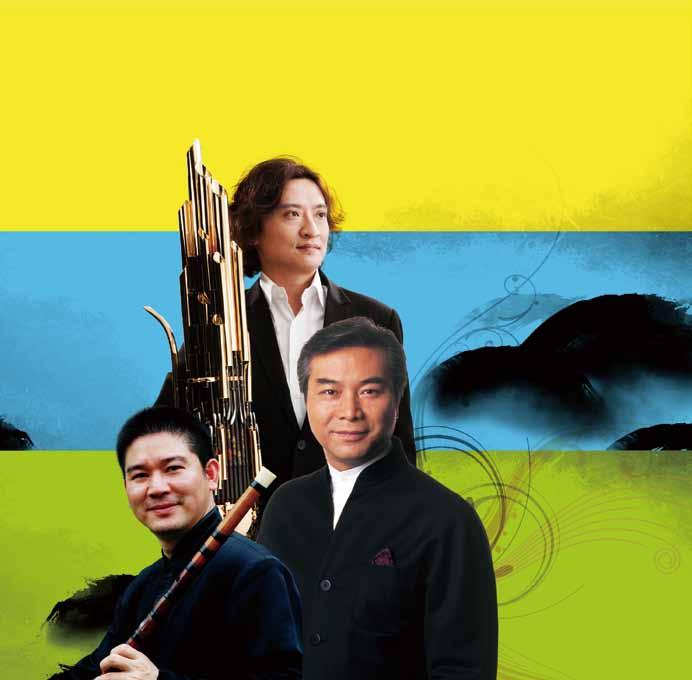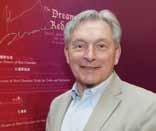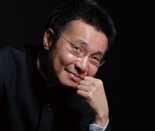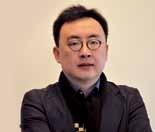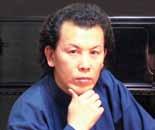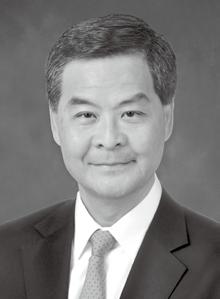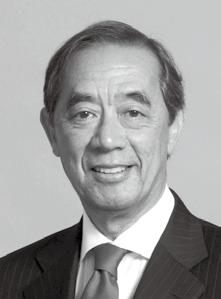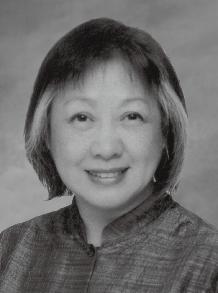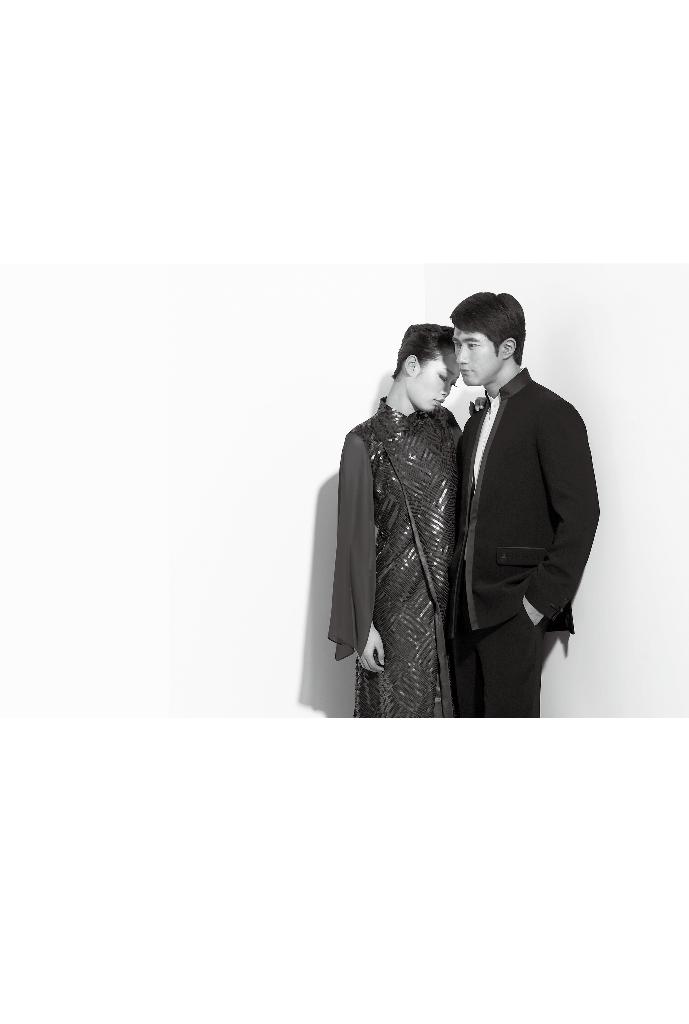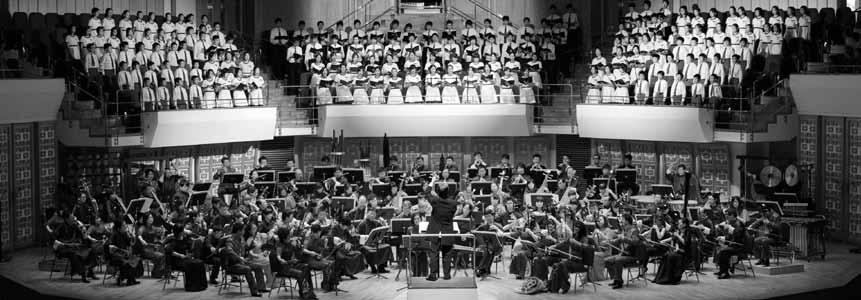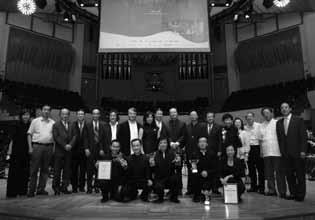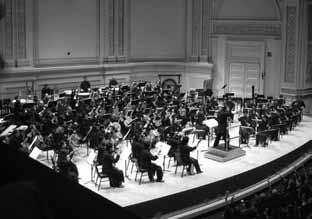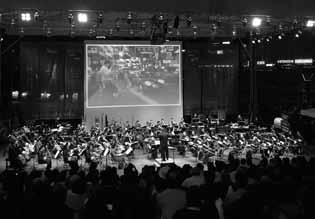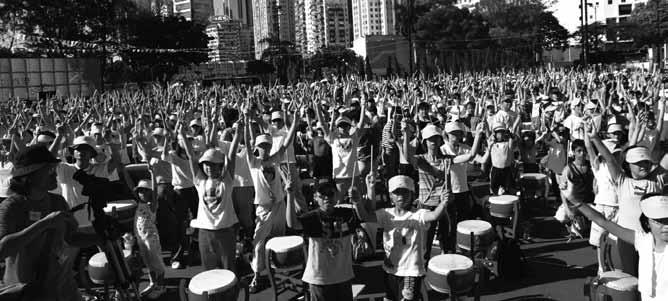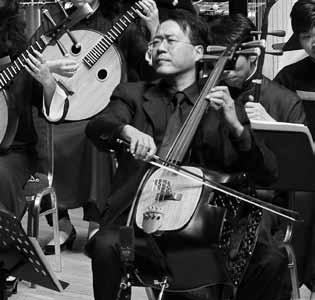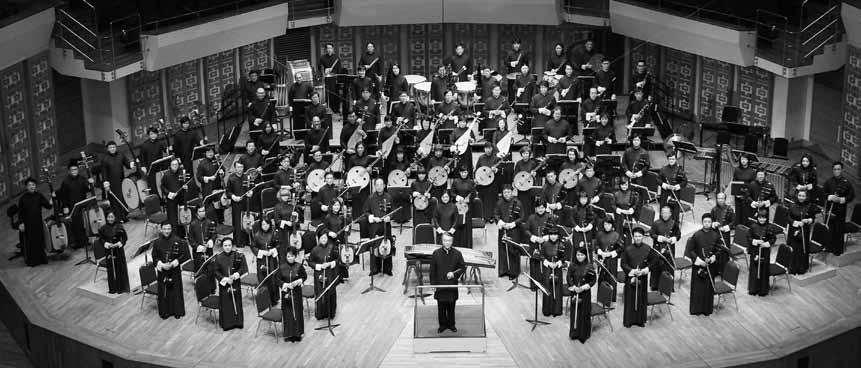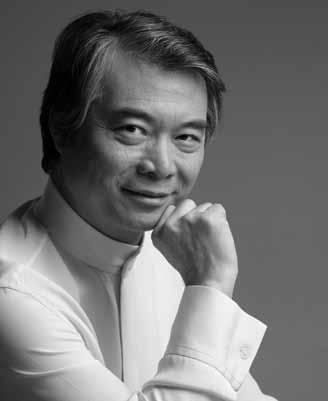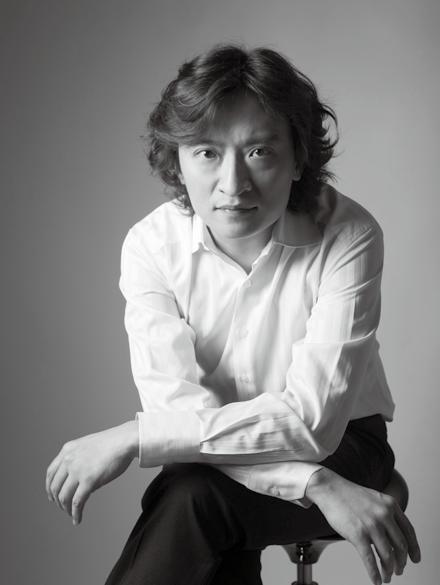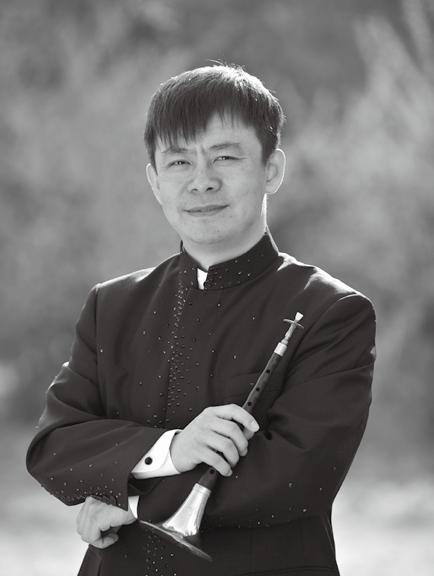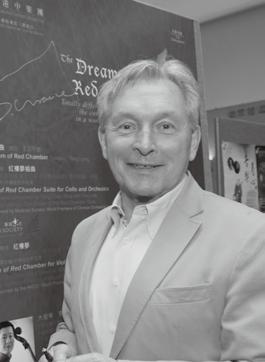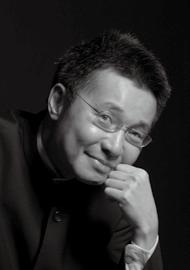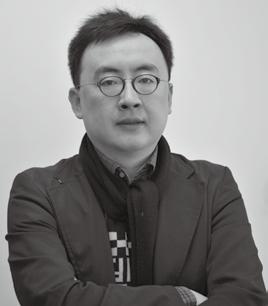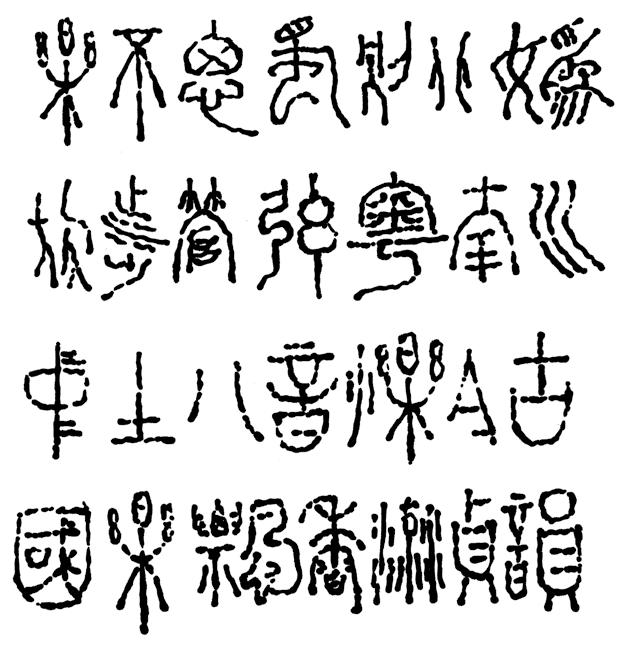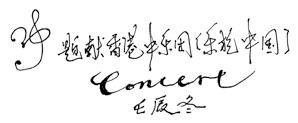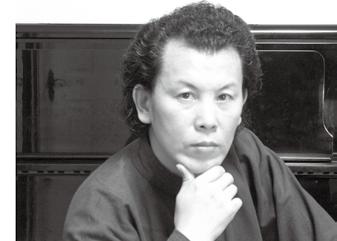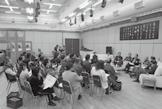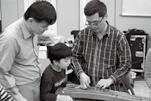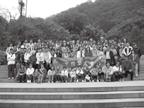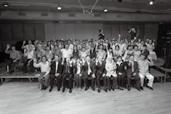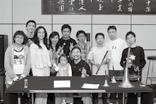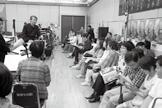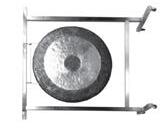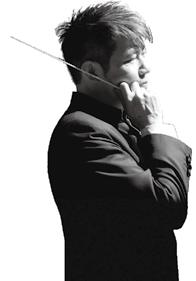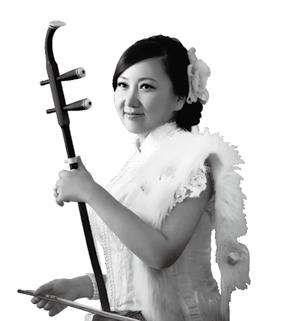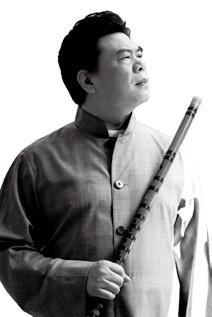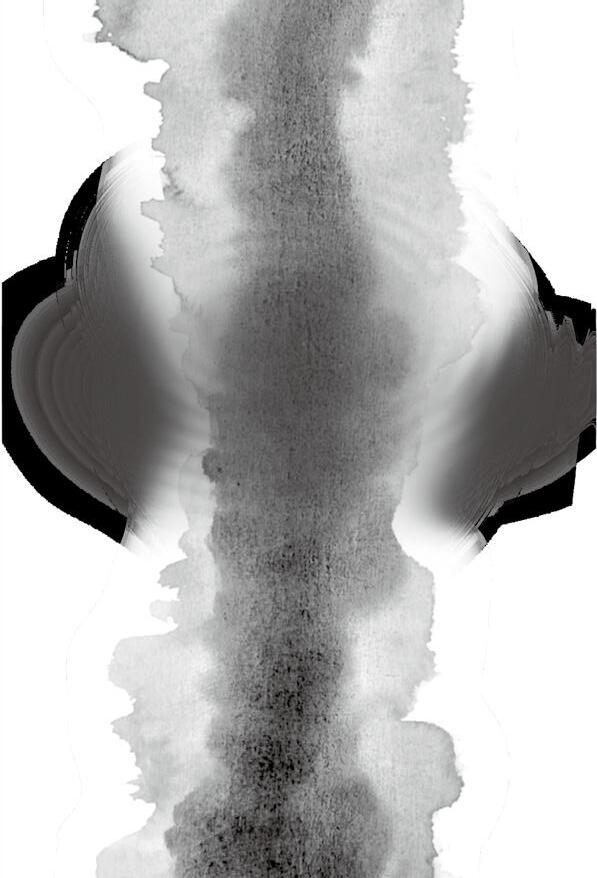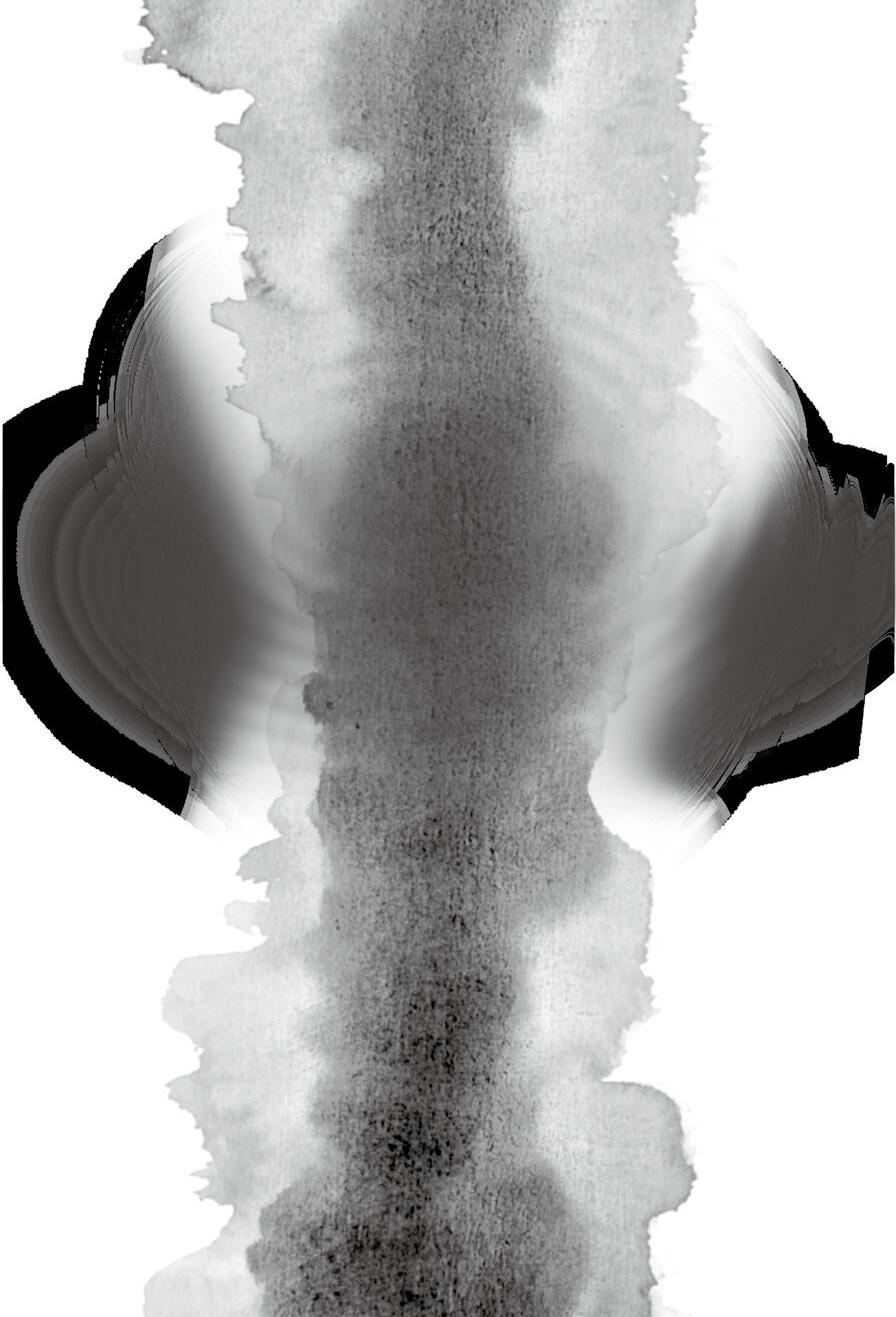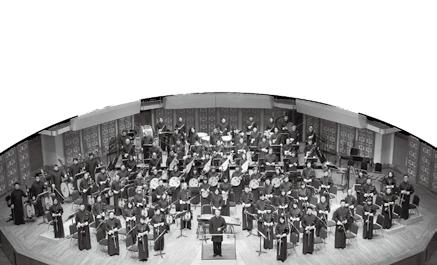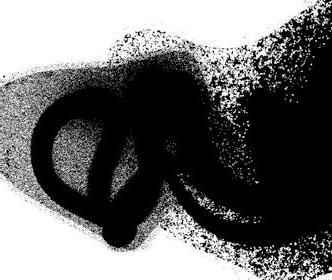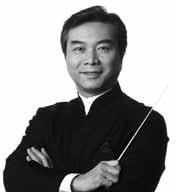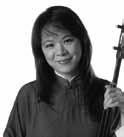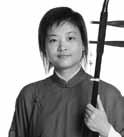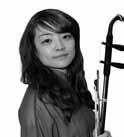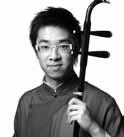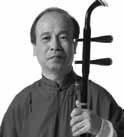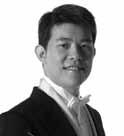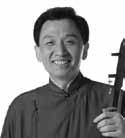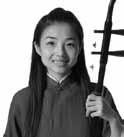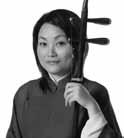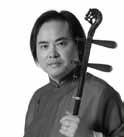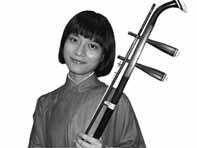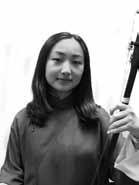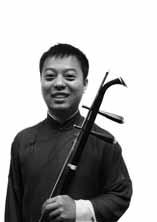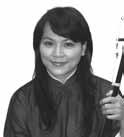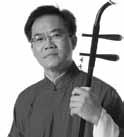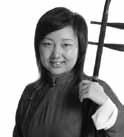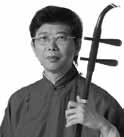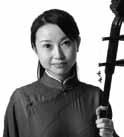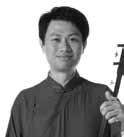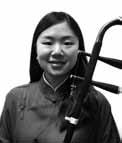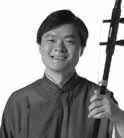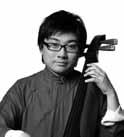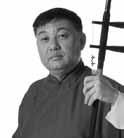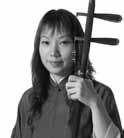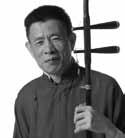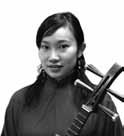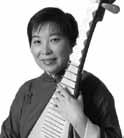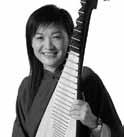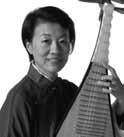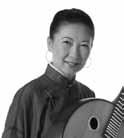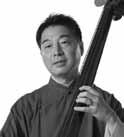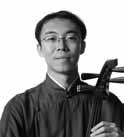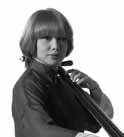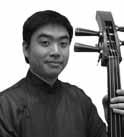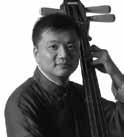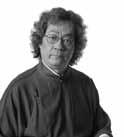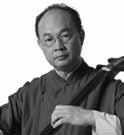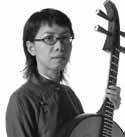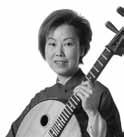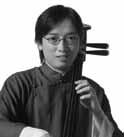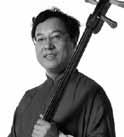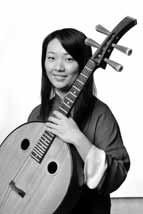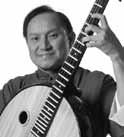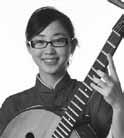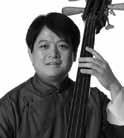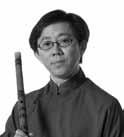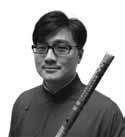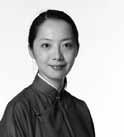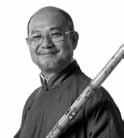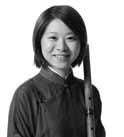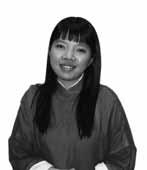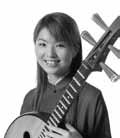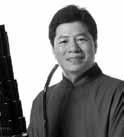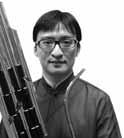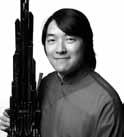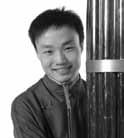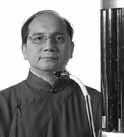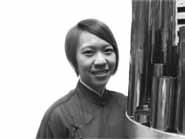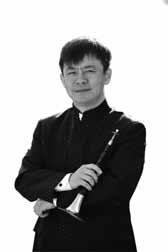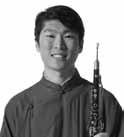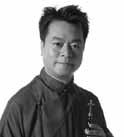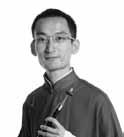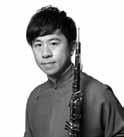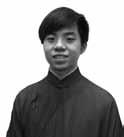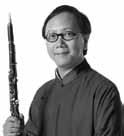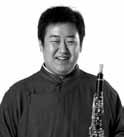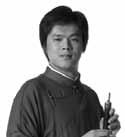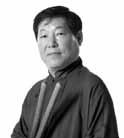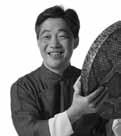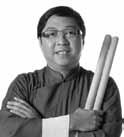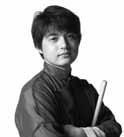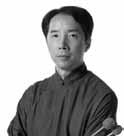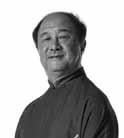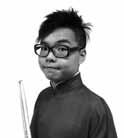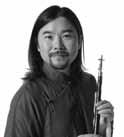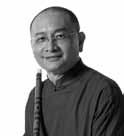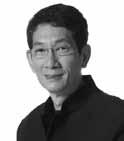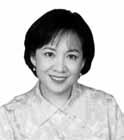Hong Kong Chinese Orchestra
Background
• The Orchestra was founded in 1977 and is the only professional, full-sized Chinese orchestra with 85 musicians in Hong Kong. It came under the management of the Hong Kong Chinese Orchestra Limited on 1 st April, 2001 when the latter took over from the Leisure and Cultural Services Department of Hong Kong. Under the leadership of the incumbent Artistic Director and Principal Conductor Yan Huichang (1997date), and former Music Directors - Ng Tai-kong (1977-1986), Kuan Nai-chung (1986-1993) and Henry Shek (1993-1997), the Orchestra has been promoting Chinese music as its mission.
• The Orchestra is deeply rooted in the Chinese cultural heritage. Its performance format and repertoire include both traditional Chinese music and contemporary full-scale works. It also explores new frontiers in music through commissioning new works of various types and styles, and over the years, has commissioned over 2,100 original compositions and arrangements, many of which have won awards at home and abroad. The Orchestra currently has an establishment of 85 musicians who perform in the four sections comprising bowed-strings, plucked-strings, wind and percussion instruments. Traditional as well as improved Chinese instruments are incorporated.
Scope of Activities
• To bring the colourful world of Chinese music to the people of Hong Kong, the Orchestra organizes more than one hundred regular and outreach concerts every year, as well as mass activities and arts festivals, including Hong Kong Huqin Festival, Hong Kong Drum Festival, Hong Kong Dizi and Xiao Festival, Hong Kong Zheng Festival, Hong Kong Yanqin Festival, Composers’ Festival of Hong Kong and Conductors’ Festival of Hong Kong.
• As a cultural ambassador of Hong Kong, the Orchestra has been invited to perform at various famous venues in the world and at international festivals. It has performed in Australia, Singapore, Japan, South Korea, mainland China, Taiwan, Macao, Canada, the United States, Holland, Austria, Germany, England, France, the Czech Republic, New Zealand, Ireland, Russia; Belgium and Norway (Arctic Circle).
• To promote Chinese music to different sectors of the community and to provide long-term financial support for the development of the Orchestra, the Friends of HKCO was set up in 1998 and the HKCO Development Fund was set up in 2002.
• To nurture the growth of a new generation of music-makers and audience in Chinese music, the Orchestra gives performances in schools and organizes instrumental classes. The Hong Kong Children Chinese Orchestra and the Hong Kong Junior Chinese Orchestra were established in 2003. Educational projects were organized in conjunction with television stations, radios and other institutions, and a CD-ROM entitled The
Treasure of Chinese Music: The Huqin was produced and released by the Orchestra.
• The Orchestra has joined hands with the Hong Kong Arts Development Council, The Hong Kong Academy for Performing Arts, universities and tertiary institutions of Hong Kong in music education projects such as the Artistic Exchange Programme, the Internship Scheme, and The Hong Kong Academy for Performing Arts/ HKCO - Institutions Partnership Programme & Professional Orchestra Internship. In 2009, the Orchestra established the world’s first Chinese orchestral academy - The HKCO Orchestral Academy with the Xi’an Conservatory of Music.
• The Orchestra continues to develop and conduct research on Chinese traditional and contemporary music, and to strive to achieve the best acoustic effects through reforming instruments by setting up the Folk Music Group, the Chamber Music Group and the Instrument R & D Group.
• The Orchestra has an extensive discography of over 50, which includes live recordings of its concerts, studio recordings etc. in CD, VCD and DVD formats. It also launched the world’s first ever SACD recording of a live concert by a Chinese orchestra in 2003.
• The Orchestra performed the soundtrack music for such award-winning films as Warriors of Heaven and Earth and Kung Fu Hustle.
• Apart from collating and publishing papers presented at the symposia and conferences, the Orchestra also publishes books on Chinese music. The titles published to date are The Enjoyment of Chinese Orchestral Music and A Handbook to Appreciating Chinese Orchestral Music.
• In carrying out social commitments, the ‘Music for Love’ scheme was set up in September 2005 to bring the beauty of Chinese music to the underprivileged like seniors, orphans and single-parents centres etc.
International Competitions, Conferences and Symposia
• The Orchestra organized an international conference on the development of Chinese music, entitled Retrospect and Development of Modern Chinese Orchestra. Experts and scholars attending came from Hong Kong, China and overseas, and many enlightening views were raised on the occasion. (1997)
• The Orchestra organized the International Competition for Chinese Orchestral Composition 2000 and the Chinese Orchestra Composition Symposium to promote Chinese orchestral compositions and explore the acoustic effects through different configuration layouts. (2000)
• The Orchestra organized a seminar series entitled On the Ecology of Chinese Music in a Modern Environment and Its Future Developments, and also invited music lovers and eight professional orchestras to take part in the worldwide poll for ‘Golden Chinese Classics of
“It was as fascinating to see the Orchestra as it was to hear it.”
Anthony Tommasini,
the Century’. (2002)
• The Orchestra organized The Fourth International Symposium on Chinese Music - Tradition and Evolution. (2007)
• The Orchestra organized the ever first Conducting Competition for Chinese Music , followed by the Hong Kong Symposium for Conducting. Local and overseas experts in the field, academics as well as representatives at senior executive or artistic level from orchestral groups in Asia were invited to participate. (2011)
• The Orchestra organized The International Composition Prize 2013 with The Luxembourg Society for Contemporary Music. (2013)
Achieving Guinness World Records
• A new Guinness World Record was set by the Orchestra when about a thousand erhu players played at a mass performance entitled Music from a Thousand Strings. The official entry was made as the largest number of people performing the erhu at the same time. (2001)
• The Orchestra held the Opening Rally of the Hong Kong Drum Festival at an unprecedented mass performance witnessed by all Hong Kong, when three thousand Hong Kong citizens played a drum piece, The Earth Shall Move. The event marked another Guinness World Records entry for the Orchestra and served to boost the morale of the people of Hong Kong after the ravages of SARS. (2003)
• More than 500 dizi players joined the HKCO in a mass performance at the Opening Ceremony of the Hong Kong Dizi and Xiao Festival 2005 - another world record for having the largest number of people playing the dizi together. (2005)
Honours and Awards
• The Orchestra was awarded for ‘The Most Outstanding Achievement in Advancing Contemporary Chinese Music’ by the ISCM World Music Days 2002 Hong Kong. (2002)
• The Orchestra was the first performing arts group to be awarded ‘Directors of the YearStatutory / Non-profit-distributing Organisation Board’ by The Hong Kong Institute of Directors for achievement in corporate governance. (2004)
• The Orchestra was the first performing arts group to be awarded ‘2004 Best Corporate
Governance Disclosure Awards - Gold Award of Public Sector / Not-for-profit Category’ by the Hong Kong Institute of Certified Public Accountants. (2004)
• The Orchestra was the first performing arts group to be awarded for ‘The 28 th Top Ten Chinese Gold Songs Award - The Golden Needle Award’ by Radio Television Hong Kong. (2005)
• The Orchestra was the first performing arts group to be awarded the ‘Caring Organisation’ logo by The Hong Kong Council of Social Services. (2005-2012)
• The Orchestra was awarded the ‘Most Outstanding Achievement in Advancing Asian Contemporary Music’ by the Asian Composers League. (2007)
• Roots of the Chinese, a recording that featured the Orchestra, won two awards in the ‘Instrumental Music - Album’ category and the ‘Instrumental Music - Performance’ category at the 6th China Gold Record Awards. (2008)
• The Orchestra was the first performing arts group to be awarded the Judging Panel’s Grand Prize in The 2nd Hong Kong Corporate Branding Award. (2008)
• The Series of Eco-Huqin developed by the Orchestra was awarded the ‘Hong Kong Awards for Environmental Excellence - “Class of Good” Productwi$e Label’. (2008)
• The Chinese Music Alive Scheme of the Orchestra was awarded the Certificate of MeritAward for Arts Education by the Hong Kong Arts Development Council. (2011)
• ‘The Hong Kong Chinese Orchestra presents the world’s first Hong Kong International Conducting Competition for Chinese Music’ was voted as one of the Top 10 Music Headlines by the related industries and Hong Kong citizens in two consecutive years. (2011, 2012)
• The Hong Kong International Conducting Competition for Chinese Music of the Orchestra was awarded the 2011 Bronze Award for Arts Promotion (Group/Organisation Category) by the Hong Kong Arts Development Council. (2012)
• The Series of Eco-Huqin developed by the Orchestra was on the honours list of the fourth “Ministry of Culture Innovation Awards” of the People’s Republic of China. (6.2012)
The HKCO at Hong Kong Cultural Centre Concert Hall
The New York Times
Yan Huichang
Artistic Director and Principal Conductor / Conductor
1987年中國首屆專業評級獲授予國家一級指揮。
閻氏於1983年以優異成績畢業於上海音樂學院,隨即受聘為中國中央民族樂團首席指揮兼樂 隊藝術指導。曾先後指揮北京、上海、台灣、新加坡及香港等地所有專業中樂團。自1997 年6月起履任於香港中樂團。歷年來獲獎無數,包括新加坡政府「2001年文化獎」、香港特 別行政區銅紫荊星章、第六屆中國金唱片獎綜合類評委會特別獎(指揮類)、台灣第五十一 屆中國文藝獎章(海外文藝獎(音樂))等。閻氏現應聘擔任多間音樂院校客席及特聘教 授,秉持傳承理念,曾多次於國內外及香港進行演講及教授工作,更為首位華人講者獲邀至 Conservatoire national supérieur de musique et de danse de Paris講學。現為香港演藝學院 榮譽院士及其音樂學院訪問學人、中國音樂學院教授及碩士研究生導師。
在過去十多年,香港中樂團在閻氏的帶領下, 創下多個中樂發展的里程碑。近年,樂團獲各地知名藝術節及音樂節邀請演出,藝術成就獲 業內人士、傳媒、觀眾的肯定。於香港中樂團推行全方位拓展,在音樂藝術方面,不但傳承 千年之樂章、南柔北剛之神韻,推動委約作品,亦積極與西方音樂界互動、探索交融,「樂 旅中國」成為品牌音樂會、領導發展樂器改革—環保胡琴系列;於教育方面,倡議香港演 藝學院與香港中樂團合作並實施「專業樂團實習計劃」,及倡議創立全球首個中樂團樂隊學 院;於普及中樂方面,創辦器樂節,包括鼓、笛簫及箏;於中樂專業範疇方面,曾舉辦主持 多次中樂國際研討會及高峰論壇、於香港演藝學院開設中樂指揮碩士課程、倡議舉辦全球首 屆國際中樂指揮大賽,獲國內外各專業音樂學院廣泛支持。
閻氏亦為活躍作曲家,創作樂曲屢次獲獎, 作品包括交響音畫《水之聲》、琵琶獨奏《思鄉曲》。其他作品包括佛教音樂《溈仰宗》、 《青蓮遇月》和《傳燈續明》等。閻氏早期曾創作及監製電腦音樂作品唱片專輯,其指揮香 港中樂團的影音產品亦陸續推出。除中樂指揮外,他亦涉足於西洋交響樂隊指揮,曾合作的 樂團包括北京交響樂團、北京音樂廳愛樂交響樂團、中國中央交響樂團、俄羅斯愛樂管弦樂 團及深圳交響樂團等,現為浙江交響樂團之中國音樂常任指揮。
Y an Huichang was conferred the title of National Class One Conductor at the First Professional Appraisal of China in 1987. After graduating from the Shanghai Conservatory of Music in 1983, Yan was appointed Principal Conductor and Artistic Director of the Chinese National Orchestra of China. As a conductor who has worked with all professional Chinese orchestras in Beijing, Shanghai, Taiwan, Singapore and Hong Kong and philharmonic or symphony orchestras such as the China National Symphony Orchestra and the Shenzhen Symphony Orchestra. He joined the Hong Kong Chinese Orchestra in June 1997. Over the years, he has received numerous accolades and awards, such as the ‘Cultural Medallion (Music)’ by the National Arts Council of Singapore in 2001, a Bronze Bauhinia Star (BBS) by the Hong Kong SAR Government, the Jurors’ Award for Conducting at the 6 th China Gold Record Awards – Multi Arts Category, and the Overseas Award for Music at the 51st Literary and Art Works Awards in Taiwan. He is currently a Visiting Professor or Adjunct Professor in many conservatories. He regularly gives talks and lectures in Hong Kong and Overseas to promote Chinese music as a legacy. He is now an Honorary Fellowship by HKAPA, with an appointment as Visiting Scholar of its School of Music, and a Professor at the China Conservatory and a Supervisor on its Master’s programme. He was the first ever Chinese to hold master classes in the Conservatoire national supérieur de musique et de danse de Paris.
L ed by Yan, the Hong Kong Chinese Orchestra has been setting many milestones in Chinese music over the last dozen years or so. On the global front, it has been frequently invited to perform in arts and music festivals, and its artistic accomplishments have been endorsed by music professionals, the media and audiences worldwide. At its home base in Hong Kong, the Orchestra has seen omni-directional growth. Artistically, it has contributed to the Chinese music legacy by perpetuating its history of a thousand years, showcasing the spectrum of regional music on China’s vast territory, and commissioning new works. It has also reached out proactively to the world of Western music to explore new frontiers together – one outstanding example of which is the annual concert series, Music About China, now becoming a hallmark event of the Hong Kong Chinese Orchestra. It has also led the way in instrumental reform with its ‘Eco-Huqin’ series. In terms of education, the Orchestra was the first to initiate the Professional Orchestra Internship scheme through collaboration with the Hong Kong Academy for Performing Arts and the establishment of the world’s first Chinese orchestral academy, The HKCO Orchestral Academy. In bringing Chinese music to a wider audience, the Orchestra has organized themed festivals based on instrumental types, such as drums, dizi and xiao, and zheng. On a professional level, the Orchestra has hosted several international symposia on Chinese music, organized the first ever ‘International Conducting Competition for Chinese Music’, which won the enthusiastic support of music institutions in China and other parts of the world, and created a Master’s degree programme in Chinese music conducting at The Hong Kong Academy for Performing Arts.
Yan is also actively engaged in composition, with many award-winning works. His representative works include the symphonic poem The Sound of Water, Nostalgia for pipa solo, Buddhist music The Weiyang Sect, Qing Lian Yu Yue (‘Cyan Lotus under the Moon’) and Chuan Deng Xu Ming (‘The Passing of the Light’). In the early years of his career, Yan had been the composer and producer of digital music for record releases. The Hong Kong Chinese Orchestra’s audio and video releases over the years have been made under his baton. In addition to Chinese music, Yan has also been involved in music of other genres. The professional orchestras he has worked with include the Beijing Symphony Orchestra, Philharmonic Orchestra of Beijing Concert Hall, China National Symphony Orchestra, Russian Philharmonic Orchestra of Moscow and Shenzhen Symphony Orchestra of China. He is currently the Specially Invited Conductor of Chinese Music of the Zhejiang Symphony Orchestra of China.
Dai Ya Dizi
著名笛子演奏家、中央音樂學院教授、碩士生導師、民樂系管樂教研室主任,中國音樂家協 會會員、中國民族管弦樂學會常務理事、中國笛子學會副會長。
七歲開始習笛,九歲起師從笛子大師趙松庭。1977年考入浙江省藝術學校。1981年獲「西湖 之春」笛子比賽第一名。1986年考入中央音樂學院,先後師從著名笛子演奏家曾永清、劉管 樂。1990年畢業留校任教。1991年在北京音樂廳舉辦了笛子獨奏音樂會。1995年獲「國際民 族器樂獨奏大賽」及台北「第三屆民族器樂協奏大賽」笛子第一名。2009年首次在國內舉辦 了笛子協奏曲專場音樂會,亦為全國唯一一位「民樂大賽」笛子三連冠獲得者。
近年來,先後多次與世界著名的交響樂團、管弦樂團、民族管弦樂團、中樂團等合作舉辦了 笛子獨奏、協奏音樂會,在國內外獲得極高的聲譽。曾應瑞典皇家音樂學院、哥德堡音樂學 院、香港演藝學院、澳門演藝學院、新加坡藝術理事會等之邀,舉行大師班講學演出。
編有《中央音樂學院笛子考級教材》(國內版和海外版)、中國音協《笛子考級教材》、 《笛子曲博覽》、《新改良竹笛 — 八孔笛應用教程》,著有《中國竹笛與西洋管弦樂隊合作 的實踐和思考》等論文。
Dizi virtuoso Dai Ya is on the faculty of the Central Conservatory of Music, a supervisor on its Master’s degree programme and Head of the Chinese Wind Music Research Centre. He is a member of the Chinese Musicians’ Association, an executive member of the Council of the China Nationalities Orchestra Society, and Vice President of the China Dizi Society.
He began learning dizi at seven, and received training under the dizi legend, Maestro Zhao Songting. He entered the Zhejiang Arts School in 1977, and came first in the “Spring on West Lake” Dizi Competition in 1981. He entered the Central Conservatory of Music in 1986 where he was trained under the famous virtuosi, Zeng Yongqing and Liu Guanyue. Upon graduation in 1990, he joined the faculty there. The following year, he gave a solo recital at the Beijing Concert Hall. He won the International Solo Competition for Ethnic Instrumental Music and the first prize at the 3 rd Ethnic Instrumental Concerto Competition held in Taipei in 1995. In 2009, he gave the first dizi concerto concert in China. He is also the only dizi champion to have plucked the laurels for three consecutive years in the Folk Music Competition in China.
Dai has won acclaim at home and abroad with his many dizi performances with famous orchestras of the world, whether in Western or Chinese music. He has given master classes, lectures and performances at the invitation of the Royal College of Music in Stockholm (KMH), the Music Conservatory Gothenburg, The Hong Kong Academy for Performing Arts, the Macao Conservatory and the National Arts Council of Singapore.
Dai has published several books as teaching aids and student guides for dizi - one for accreditation examinations of the Central Conservatory of Music and three published by the Chinese Musicians’ Association - as well as an academic paper, On the Collaborative Musicmaking between the Chinese Bamboo Flute and the Western Philharmonic Orchestra - Some Thoughts and Practical Experiences.
笙
Chen Yi-wei Sheng
灣台中人,2011年9月出任香港中樂團笙助理首席。
自幼即在藝術上展露天份,曾獲 1984 年冬季奧林匹克運動會繪畫創作項目比賽優選佳作獎。
三歲學習鋼琴,並陸續學習敲擊、二胡、大提琴、笙、倍低音提琴、中國笛、長笛、薩克斯 管、電子琴與阿根廷手風琴等多項中外樂器。中學時期曾多次獲全台灣音樂比賽笙獨奏第一 名。中學後以笙主修考入國立台灣藝術專科學校國樂科(現改制為國立台灣藝術大學),專 科學校畢業後以鋼琴主修考入台北市私立實踐大學民生學院音樂系。
在學期間,於海內外參與各種不同類型的演出,為其日後的演出及創作奠定了厚實的基礎, 並投入音樂製作與樂曲創作。於流行音樂製作方面,除在台灣參與歌手專輯錄製、配唱與編 曲工作,亦曾數度赴北京為內地歌手錄製流行音樂專輯。樂曲創作方面曾陸續受多個樂團委 託創作,並為台灣宜蘭蘭陽博物館開幕創作主題曲。其創作兼容了傳統與創新,在風格上, 亦嘗試融合台灣民謠、爵士樂、世界音樂、阿根廷探戈及中國音樂等多樣曲風,為年輕一輩 不可多得之演奏家及創作者。
Chen Yi-wei is a native of Taichung, Taiwan. He joined the Hong Kong Chinese Orchestra as Assistant Sheng Principal in September 2011.
Chen’s gift in the arts was discovered at a very young age. He was the winner of the Best Work Prize in the 1984 Winter Olympic Art Competition. He learned the piano at the age of three, and went on to learn percussion, erhu, cello, sheng, double-bass, dizi, the Western flute, saxophone, clavinova and bandoneon. While in high school, he was already a multiple winner of sheng solo in territory-wide competitions. He later entered the National School of Arts (now the National Taiwan University of Arts) to study Chinese music, and upon graduation, he enrolled in the College of Human Ecology of the Shih Chien University in Taipei to study piano at its Department of Music.
While at the University, he participated in various types of shows in Taiwan and abroad, which laid the foundation for his career as a performing and creative artist. He also worked in music production and composition. He was actively involved in pop music studio work, which included recordings for Taiwan singers, vocal dubbing and music arrangement. He also went to Beijing on several occasions to produce album recordings for Mainland singers. As a composer, Chen has been commissioned by many ensembles and institutions to write new works, one of the notable examples being the theme song to mark the opening of the Lanyang Museum in Yilan, Taiwan. He is an eclectic composer whose works embrace the traditional and the innovative, integrating Taiwan ballads, Jazz, world music, Tango Argentino and Chinese music. 陳奕濰
Niu Jiandang Guest Principal Suona
央音樂學院嗩吶碩士畢業,現為中央音樂學院客座教授、中央民族樂團樂隊副隊長及嗩吶 聲部副首席、中國民族管弦樂學會樂器製作和改革委員會副會長。
牛建黨曾隨團出訪過德國、奧地利、法國、美國、荷蘭、埃及、希臘、匈牙利、捷克、俄羅 斯、挪威、澳洲、新加坡、泰國,及香港、澳門、台灣等國家和地區。在著名作曲家譚盾創 作的《西北組曲》中,首次將民歌演唱運用到樂隊作品當中,並成功擔任了《信天遊》的領 唱與嗩吶領奏,引起了很大的反響,在國內外數百場演出中,獲得極大成功。
多年來還為大量唱片、電影、電視劇錄製了嗩吶獨奏曲、插曲、主題歌,並錄製了個人演唱 專輯《敖包的美麗I》、《敖包的美麗II》兩張。近期在著名導演林兆華執導、著名作曲家郝維 亞擔綱作曲的音樂話劇《說客》中,獨自包攬了所有民族管樂器的演奏,整部話劇的核心音 樂全部由嗩吶、笛子、笙、管、簫、塤等樂器完成,還在劇中擔任重要的領唱任務。德國漢 堡藝評家評他為:「一位全能演奏家」。
牛氏多年來一直致力於樂器改革和研究工作,為加鍵嗩吶的不斷進步和發展起到了積極的推 動作用,多項建議和方案得到採納,特別是與吳氏管樂廠共同研製開發的低音嗩吶已成為各 個樂團的常規樂器,填補了管樂聲部低音的空白。
Niu Jiandang holds a Master’s degree in Suona Studies from the Central Conservatory of Music, and is currently one of its Visiting Professors. He is also the Associate Leader and Sub-Principal of the Suona Section of the China National Orchestra, and Vice President of the Instrument Making and Remodelling Committee of the China Nationalities Orchestra Society.
Niu has gone on many overseas tours as a member of the orchestra, having visited Germany, Austria, France, the U.S., Holland, Egypt, Greece, Hungary, the Czech Republic, Russia, Norway, Australia, Singapore, Thailand, Hong Kong, Macao and Taiwan. In performing Tan Dun’s Northwest Suite, he performed the vocal part using a folk singing style in the orchestral work. He also won acclaim as the lead singer and lead suona in performing Xin-Tian-You hundreds of times in concerts and shows, both in China and overseas.
Over the years, Niu has made numerous recordings, including suona solo for records, and soundtrack and theme music for films and television dramas. His discography includes two solo vocal albums, The Beautiful Mounds of Mongolia I and II. In the musical drama The Persuader, directed by Lin Zhaohua and scored by Hao Weiya, he took up the task of providing instrumental music for the whole production by playing the suona, dizi, sheng, guan, xiao and xun, as well as playing the lead singer role. An arts critique in Hamburg, Germany, describes him as “an all-round instrumentalist” for this feat.
Niu is also dedicated to the remodeling of and research in Chinese instruments. He is the driving force behind the improvement of the keyed suona as well as its development. Many of his ideas and proposals have been accepted and put into production. The bass suona , which he developed with the help of a famous manufacturer of Chinese wind instruments, has entered into the configuration of many Chinese orchestras, thus complementing the bass voice of the wind section.
徐美婷︱古箏
著名古箏演奏家及 教育家
蕭秀蘭︱中胡 資深二胡演奏家及 教育家
張重雪︱二胡 中國文化藝術政府獎 ─金獎
朱文昌︱笛子
香港竹笛學會會長 中國管樂協會會員 歷任香港學校音樂節 比賽評判
劉海︱嗩吶
青年優秀嗩吶演奏家 趙太生︱三弦
首屆海內外江南絲竹比 賽獲「敦煌一等獎」
中央/上海音樂學院考試精進班
如你準備報考中央音樂學院或上海音樂學院各級中樂器樂評級試,又對考試曲目不熟 悉,本課程正是你精進考試演奏技巧的最佳選擇。我們有鑽石陣容的師資,全是經驗 豐富的中樂演奏家,專門教授考試樂曲。授課樂器包括:二胡、琵琶、揚琴、古箏、 柳琴、笛子、中阮、嗩吶、笙、葫蘆絲及巴烏等,學員會透過互相觀摩及導師點評, 提升考試樂曲演奏技巧以獲取佳績。課程設個人班,(全期 12 節,每節 45 分鐘),及 小組班( 4-5 人,全期 12 節,每節 1 小時)。報名日期為 1 至 3 月,上課時間將安排於 4 至 7 月的星期六、日早上進行。 中央/上海音樂學院考試講堂
本課程由樂團著名演奏家指導,將講解中央音樂學院或上海音樂學院中樂器樂評級 試的考試樂曲,每名學員都有現場演奏的機會,讓考生更深入了解考試演奏技巧、 風格、要點及提升考生心理素質,並獲發樂團證書。課程每講為 1 小時,每講收費 HK$150 ,全期共 4 講,報名日期為 1 至 3 月,上課時間將安排於 4 至 7 月的星期六、日早 上進行。
以上課程細節及導師安排由香港中樂團決定。 查詢請電: 3185 1641 / 1624 / 1680 / 1611
與香港中樂團教育及外展部聯絡, 或到 www.hkco.org 下載課程表格,並以電郵或傳真方式交回。
‧克勞澤曲
Memories of the East Zygmunt Krauze (Commissioned by the Hong Kong Chinese Orchestra / World Premiere)
作曲家的話 What the composer says
我在1980年代初多次踏足香港及台灣,至今已超過十次;稍後更與中國內地結緣。在我眼 中,這裡是全球最迷人、最美麗的地區之一。過去三十多年間,我見證了這個地區不斷發 展,不斷轉變,每次重來,總是開心地發掘到新事物,與找尋昔日的傳統。
《東方回憶》記下了我這些年遊訪此地區時的心動感受、這兒的朋友、遇過的人,甚至在路 上、船上、城市周邊小村落見到的人。樂曲描寫的不只是山與水,還有這些大城市的澎湃活 力和衝勁。
I have visited Hong Kong and Taiwan more than ten times since the early 1980s. Later, I discovered China. It is, for me, one of the most fascinating and beautiful part of the world. I have witnessed the development and the changes spanning over the last thirty years, and am always happy to discover the new and find the traditional….
Memories of the East describes the emotional moments which I experienced during my numerous visits. Most of all, it describes my friends, the people I’ve met, and the people in the streets, on boats, and in the little villages around the cities. It describes not only the mountain and rivers, but also brimming energy and determination in the big cities.
曲目介紹 Programme Notes
《東方回憶》分為多節,每節記載了我對世界的這一個地區的經歷。這是一個歐洲作曲者眼 中所見、心中銘感的一方水土人情,是我欣賞但總無法完全明白,所以更覺得吸引迷人。
《東方回憶》是應香港中樂團的委約創作,謹以此題獻給閻惠昌大師。
Zygmunt Krauze Composer
— 西格蒙‧克勞澤
Memories of the East is in several episodes which relate to my experience and this part of the world. It is a European composer’s personal and emotional approach to the Chinese people and a culture, which I admire but do not understand to the full. This is why I find it even more fascinating.
Memories of the East was commissioned by the Hong Kong Chinese Orchestra. I dedicate it to Maestro Yan Huichang.
- Zygmunt Krauze
* The commissioned work of the HKCO is sponsored by The Robert H. N. Ho Family Foundation.
西 格蒙 ‧ 克勞澤是波蘭作曲家兼鋼琴家,早年在華沙的蕭邦音樂學院習 藝,後到巴黎隨納狄雅 ‧布蘭加深造。多年來,他與不少一流樂團合作, 在名家指揮下演出,包括貝田尼、簡倫茲、沙加斯澹、科特、秋山和慶、 朱科夫斯基、保爾、贊達、韋之、艾特伏、德立弗等。
他的作品數量甚多,包括五套歌劇、多套器樂協奏曲、交響曲和室樂作品,又曾與建築師合 力創作空間音樂,迄今已在波蘭、奧地利和法國演出,而他的音樂作品也曾由全球多個一流
自1965年起,克勞澤在全球多所著名新音樂中心舉行講座及大師班,包括德國達姆施塔特、 瑞士巴塞爾、瑞典斯德哥爾摩、洛杉磯、東京、耶路撒冷、巴黎及紐約。1982年曾出任耶魯
大學客席教授;1996年獲南韓啟明大學提名為「傑出通訊教授」;自2002年起出任波蘭羅茲 音樂學院的作曲教授,2006年起在華沙蕭邦音樂學院任教。
他獲得的榮譽與獎項包括:波蘭十字銀章(1975)、波蘭青年音樂家優異獎(1979)、法國 藝術及文學武士榮銜(1984)、兩度獲波蘭文化部獎(1989、2005)、國際現代音樂協會的 榮譽會員(1999年起)、十字金章(2004)、智利瓦爾帕萊素頒贈聯合國教科文組織的人文 遺產獎(2005),以及獲法國總統頒授法國軍團武士榮譽勳章(2007)。
Polish composer and pianist Zygmunt Krauze studied composition and piano at the Frederic Chopin Academy of Music in Warsaw and with Nadia Boulanger in Paris.
He has played with many leading orchestras, conducted by Gary Bertini, Jan Krenz, Leif Sagerstam, Kazimierz Kord, Kazuyoshi Akiyama Paul Zukofsky, Ernest Bour, Hans Zender, Antoni Wit, Peter Eoetvoes, Reinberg de Leeuw and many others.
Krauze has written five operas, several instrumental concertos and symphonic and chamber works. Together with architects, he also composed spatial music, which was presented in Poland, Austria and France. His works have been performed in major New Music festivals by leading orchestras and chamber ensembles all over the world.
Since 1965, he has given seminars as well as master classes on composition and contemporary music performance, in the pulsing centres of New Music like Darmstadt, Basle, Stockholm, Los Angeles, Tokyo, Jerusalem, Paris and New York. In 1982 he was a Visiting Professor at Yale University. In 1996, he was nominated as an Eminent Corresponding Professor at Keimyung University, Daegu, South Korea. He has been a professor of Composition at the Music Academy in Lodz since 2002, and the Frederic Chopin Music Academy in Warsaw since 2006.
Among his accolades are the Silver Cross of Merit of Poland (1975), the Medal of Distinction from Jeunesses Musicales in Poland (1979) and the title of Chevalier de l’Ordre des Arts et des Lettres in France (1984), the Prize of the Ministry of Culture in Poland (1989 and 2005), Honorary Member of ISCM (1999), the Golden Cross of Merit (2004) and the UNESCO Heritage of the Humanity Award in Valparaiso, Chile (2005). In 2007, he was appointed Officier dans l’Ordre national de la Legion d’honneur by the President of the French Republic. 西格蒙
笙協奏曲
Sheng Concerto Music for Gourd Chung Yiu-kwong
(Commissioned by the Hong Kong Chinese Orchestra / Hong Kong Premiere)
作曲家的話 What the composer says 這是香港中樂團第一次對本人的委約創作,所以特別戰戰兢兢,加上笙這件樂器極需要更多 挑戰性的協奏曲,因此,創作之前對這件樂器的歷史特別作了很多深入的研究,並打算從不 同民族但同性質的樂器曲目中發掘靈感;很自然地,這部作品到後來就超越「民族」的地理 界限,夾雜著很多不同時代與地區的音樂語言。我深信這部新作品在香港中樂團與年輕獨奏 家陳奕濰的表現下,一定會有精彩的詮釋!
This is my first commissioned work from the Hong Kong Chinese Orchestra, and I am feeling the jitters. There is the added factor that the sheng repertoire is in dire need of more challenging concertos. So, before putting musical ideas to the score sheet, I did rather thorough research on the history of the sheng and looked for inspiration from the instrumental music of various ethnic groups which may be different in indigenous origins but shares the same character. The natural outcome was that the final work crosses geographical boundaries and “speaks” the musical lingo of different regions and even different ages. I defer to the virtuosity of the young soloist in the Hong Kong Chinese Orchestra, Chen Yi-wei, to give this new work his insightful interpretation.
曲目介紹 Programme Notes
此曲是受香港中樂團委約創作,完成於2012年7月台北市。全曲長約16分鐘,為單樂章曲式的 協奏曲,但可分為快—慢—快三個緊接的段落。第一段落又可分為平靜的序奏與節奏強烈的 舞曲,和聲尖銳不協和,並發揮很多笙獨特的演奏技法與開發笙演奏多聲部的可能性。第二 段落是優美的蘆笙舞曲,快速的32分音型是對獨奏者很大的挑戰。第三段落是受到泰國笙獨 奏音樂的影響,旋律輕快活潑,連續快速和弦為其特色。最後出現一段獨奏笙的華彩樂段, 由樂團的笙組與嗩吶及敲擊組伴奏,把「匏樂」粗獷的一面發揮到極致,並將樂曲推到最高 亢激烈的氣氛下結束。
* 此曲由香港中樂團委作,並由臺北市立國樂團於2012年11月在台北首演。
This is a work commissioned by the Hong Kong Chinese Orchestra, and was completed in Taipei in July 2012. It is about 16 minutes in duration. While it is a single-movement concerto, it may be divided into three closely connected sections, designated fast-slow-fast. The first may be further divided into a calm overture and a dance tune of vibrant rhythms. It features sharp and discordant sounds, and explores a lot of performance techniques that are unique to the sheng, as well as the instrument’s capability of playing several voices simultaneously. The second section is a beautiful dance for the lusheng, and the brisk figures of demi-semiquavers present a great challenge to the performer. The third section shows the influence
of Thai music for the solo sheng, with its characteristic delightful, lively melody and continuously quick chordal successions. The last section features a cadenza by the solo sheng, with the sheng section of the orchestra, the suona, and the percussion section together giving optimum expression to the more robust character of Chinese gourd music, before the work comes to a heightened and passionate close.
- Chung Yiu-kwong
* The music was commissioned by the Hong Kong Chinese Orchestra, and premiered by the Taipei Chinese Orchestra in November 2012 in Taipei.
鍾耀光 作曲 Chung Yiu-kwong Composer
鍾
耀光是目前台灣最知名且活躍的作曲家之一,作品以廣泛的表現領域 與濃厚的中國思想背景著稱,廣受世界各地樂迷的熱愛。鍾氏的作品類型 相當多樣,涵蓋了大型交響樂、傳統戲曲、音樂劇,乃至於新世代風格的 小品等等。
鍾氏曾為國際著名演奏家如馬友友、林昭亮、克里斯汀‧林伯格、莎朗‧貝札莉、米夏‧麥斯基 與克羅諾斯弦樂四重奏等作曲。
2000年以作品《永恆之城》奪得由香港中樂團主辦的21世紀國際作曲比賽冠軍,最近完成的 創作計畫包括國立臺灣交響樂團建國百年委約《動能》、客家事務委員會委託的國樂合奏曲 《客家序曲》、臺灣管樂團委託的管樂團合奏曲《圖騰柱》,以及由姜克美與安西 ‧卡爾圖寧 世界首演的京胡與大提琴雙協奏曲《霸王別姬》等。
鍾氏於1956年生於香港,於費城演藝學院及紐約市立大學攻讀敲擊樂與作曲,1991年獲得敲 擊樂演奏博士學位,1995年獲得作曲博士學位,2007年起擔任臺北市立國樂團團長。
Chung Yiu-kwong is one of Taiwan’s best-known and most frequently performed composers. His music, distinguished by its expressive range and its profound back ground of Chinese philosophy, has won over large and enthusiastic audiences all across the globe. A highly versatile composer, he has written works ranging from large-scale orchestral works and Chinese operas and musicals to the most intimate of pieces, composed in a New Age style.
Internationally renowned artists for whom he has composed works include Yo-Yo Ma, Cho-Liang Lin, Christian Lindberg, Sharon Bezaly, Mischa Maisky and the Kronos Quartet.
In 2000, The Eternal City won first prize in the 21st Century International Composition Competition held by the Hong Kong Chinese Orchestra. Recent works include Kinetics, commissioned by the National Taiwan Symphony Orchestra for the 2012 centenary celebrations of the Republic of China, Hakka Overture for Chinese orchestra, Totem Pole for wind ensemble and Farewell My Concubine for jinghu, cello and Chinese orchestra, premiered by Kemei Jiang and Anssi Karttunen.
Chung was born in Hong Kong in 1956 and received percussion and composition training at the Philadelphia College of Performing Arts and City University of New York. He earned his D.M.A. degree in percussion performance in 1991 and Ph.D. degree in composition in 1995. He was appointed general director of the Taipei Chinese Orchestra in March 2007.
Dizi Concerto
Flowers Blooming on the Paths in the Fields
Hao Weiya (Hong Kong Premiere)
作曲家的話 What the composer says 笛子協奏曲《陌上花開》由笛子演奏家戴亞先生委約創作於2010年,並在2011年獲得第十五 屆全國音樂作品比賽二等獎。這個作品嚴格意義上來說是我的第一部比較成熟的民樂作品。
由於內地音樂學院作曲系的教學內容主要集中在西方音樂領域內,民族音樂的創作無論是樂 器法還是寫作本身基本上都是作曲家在實踐過程中不斷積累而成。
在工業化的時代,民族樂器經常由於所謂的「簡陋」而被很多人輕視,甚至作曲家有時也會 頭痛這些樂器在演奏時的「局限性」。但是在審美的多角度下,正是這些「簡陋」和「局限 性」成就了這些樂器無法替代的獨特性和無與倫比的中式音樂風格,而我在這部作品裡希望 做到發揮笛子演奏技巧的同時也兼顧到笛子自身的音樂趣味和韻味。
The dizi concerto Flowers Blooming on the Paths in the Fields was commissioned by the dizi virtuoso, Mr. Dai Ya, and was written in 2010. It won a Class Two Award at the 15th All China Music Compositions Contest the following year. In the strictest sense of it, this is my first ‘mature’ work in the Chinese music genre. The curriculum for Composition students in the conservatories in China tends to concentrate on Western music, so a composer thus trained needs to find his own way to writing Chinese music by accumulating hands-on experience, whether in terms of instrumentation or the writing process itself.
In an age of industrialization, Chinese musical instruments have often been looked with some disdain as being “crudely made”. Even composers may find it challenging to find ways to overcome their “limitations” when putting them on the concert stage. But when viewed from the broader perspective where aesthetics is concerned, it is these very “crudeness” and “limitations” that have given the Chinese instruments their uniqueness and ethnic flavour, i.e. characteristics that can in no way be replaced or emulated. In Flowers Blooming on the Paths in the Fields, I hope to show both the virtuoso techniques in performance, and the instrument’s interesting features and voice.
曲目介紹 Programme Notes
這首單樂章的笛子協奏曲分為兩個主要部分:
第一部分以悠長的氣息,和歌唱化的旋律為主要。輔助以獨奏笛子和樂隊在音響空間上的變 化、對比和銜接。
第二部分以動感的樂隊律動,和笛子動機化的音型為主要特色。強調整體音響的清晰與層次 感,和足夠的、有趣味的變化。同時,作為連接手段,在第二部分的快板中加入了獨奏笛子 的華彩片段。
這個作品能夠完成要感謝戴亞君對我的不斷鼓勵,和笛子獨奏部分的建議。
作品名稱取自宋人筆記「陌上花開,可緩緩歸矣」的語句,暗示春暖花開,盎然生機的景象。
This single-movement concerto for dizi is in two sections.
The first section features a theme melody with cantabile characteristics played with long drawn breaths on the dizi, underpinned by the shifts, contrasts and links between the solo dizi and the orchestra in the soundscape.
The second features the orchestra’s dynamic rhythms and the dizi’s motives, which present with clarity and perspective the sound structure of the work and its many and interesting variations. As linking passages between sections, the solo dizi plays a cadenza in the allegro of section two.
In writing this work, I would like to thank Mr. Dai Ya for his continuous support and encouragement, including his advice on the dizi solo section.
The Chinese title of the work is quoted from a famous letter from an ancient king to his beloved consort. She had gone back to her maternal home to visit the graves of her ancestors, and he missed her so much that he sent a letter bearing these words, “Now that the flowers are blooming on the paths in the fields, isn’t it time for you to return?” A spring scene thriving with life is vividly depicted.
- Hao Weiya
Hao Weiya Composer
西省西安人。1999年畢業於吳祖強教授作曲專業博士班。現為中央音 樂學院作曲系教授。在擔任大量教學任務的同時,郝維亞的音樂創作在題 材和體裁上都非常的廣泛。
樂隊作品包括:交響樂隊音畫《山之北、雲之南》(1994);大提琴協奏 曲《海的頌歌》(1999);民族管弦樂隊作品《傳奇II》(2002),獲2003年全國第九屆民 族管弦樂作品比賽二等獎;交響合唱《天地一太白》、《關山月》(作詞韓靜霆),獲2002 年文化部金鐘獎; 鋼琴協奏曲《長江》(2004);第一交響樂《紀念》(2005);2009 年笛子協奏曲《陌上花開》,獲全國民族管弦樂作品比賽二等獎;2010年樂隊作品《黃河 情》;2010年為上海世博會閉幕式創作音樂;2011年《想念》女高音協奏曲等。
舞台作品包括:2003年為貴州遵義雜技團《依依山水情》作曲,獲當年國家舞台藝術十大精 品工程劇碼之一;2004年行動音樂劇《兵馬俑》於加拿大和美國首演;2005年在第二屆中國 舞蹈節暨第五屆中國舞蹈荷花獎評獎中,為大型人文藝術舞蹈詩《天地之上》作曲獲最佳作 曲獎;2006年舞劇《唐妃》首演於美國;2008年為國家大劇院版本的普契尼歌劇《圖蘭朵》 重新續寫尾聲;2009年國際標準舞舞劇《長恨歌》及歌劇《山村女教師》;2010年為新版話 劇《茶館》、《說客》創作音樂;2011年舞劇《我的草原,我的夢》等。2006年至2007年作 為訪問學者在意大利羅馬的聖‧切契利亞音樂學院進修。
Hao Weiya is a native of Xi’an in Shaanxi. He completed his doctoral programme under the supervision of Prof. Wu Zuqiang in 1999, and is currently on the faculty of the Department of Composition of the Central Conservatory of Music. Aside from his heavy teaching duties, Hao is also a prolific composer whose works cover a wide range of subject matters and genres.
Some of his major works include the symphonic poem North of the Mountains and South of the Clouds (1994); the cello concerto A Paean to the Sea (1999); Legend II for Chinese orchestra (2002), which won a Class Two Award at the 9th All China Competition for Chinese Orchestral Music in 2003; the choral symphonies Li Bai between Heaven and Earth and The Moon over the Pass (with lyrics by Han Jingting), which won the Golden Bell Award presented by the Ministry of Culture in 2002; the piano concerto The Yangtze (2004); Symphony No. 1 – A Tribute (2005); the dizi concerto Flowers Blooming on the Paths in the Fields (2009), which won a Class Two Award at the All China Competition for Chinese Orchestral Music; the orchestral work For the Love of the Yangtze (2010); music for the Closing Ceremony of the 2010 Shanghai Expo; and the concerto for soprano and orchestra, Missing You (2011).
Hao has scored for many stage productions, including the Guizhou Junyi Acrobatic Troupe’s show (2003) which was shortlisted for the Ten National Fine Stage Arts Project of that year; the action-musical Terra Cotta Warriors (2004), which was premiered in Canada and the U.S. ; the dance poem Above Heaven and Earth, which was awarded Best Composition at the 5th Lotus Awards for Chinese Dance; and the dance drama Tang Royal Concubines (2006), which was premiered in the U.S.. In 2008, Hao completed Puccini’s unfinished opera, Turandot, for the National Centre for the Performing Arts in Beijing. It was followed by other musical scores, including the ballroom dance drama, Song of Everlasting Sorrow (2009); the opera, A Village Teacher (2009); the stage dramas The Tea House (the new version) and The Persuader (2010); and the dance drama, My Grassland, My Dream (2011).
Hao was a Visiting Scholar at the Conservatorio Santa Cecilia in Italy between 2006 and 2007.
媯川古韻 王寧曲 (香港首演)
The Ancient Cadence of Gui Plain Wang Ning (Hong Kong Premiere)
作曲家的話 What the composer says
釋文:
曲目介紹 Programme Notes
《媯川古韻》是為大型民族樂隊與合唱隊而作的民族器樂曲,2002年在獲台灣「文建會2002 民族音樂創作獎」大型民族器樂作品獎與本屆比賽唯一的「觀眾票選大獎」。樂曲題材源於 北京延慶一帶的媯川文化遺跡、歷史傳說及古代神話等。全曲共由三個樂章組成。音樂風格 原始、古樸,而又充滿色彩。在創作上調動民族器樂的特殊表現力,加上人聲的加入,使整 部作品既色彩絢麗,氣勢恢宏,又古雅清新,神秘飄逸。
樂曲由三個樂章組成:
一、媯河神女
以簫為主奏樂器,樂隊以色彩清新的和聲,淡雅、飄逸的配器加以襯托。音樂充滿神秘 感與色彩性。
二、古崖民居
以古崖民居為中心展開想像,音樂主題只用三個音,四度,具有簡潔、原始、古樸的氣 質。全曲以圍繞這一主題進行變奏與發展。
三、阪泉金鼓
主要描寫炎黃阪泉大戰這樣一個古代神話。樂隊主要以敲擊樂器為主,突出節奏的表現 力,並加入人聲的吶喊,中間部分有激烈的爭戰場面的描寫。音樂原始古樸、厚重而恢宏。
王寧
The Ancient Cadence of Gui Plain, written for a mixed choir and Chinese orchestra, won an award in the Chinese instrumental music category at the Chinese Music Composition Prize presented by the Council for Cultural Affairs of Taiwan in 2002, and was the only work picked as the Audience Favourite that year. The music draws inspiration from the relics of the Gui Plain Culture in the Yanqing region near Beijing, and the related legends and myths. It is cast in a simple, primitive and yet colourful idiom, and makes full use of the special expressiveness of ethnic instruments. The addition of human voices makes the work resplendently colourful and magnificent, at the same time retaining its ancient elegance and lightness, veiled in a mystique all its own.
The music is in three movements:
1.The Nymph of the Gui River
This section features the xiao as the leading instrument, supported by the orchestra with refreshing, light, subdued and yet colourful harmonies. The music is full of colours and mystery.
2.The Ancient Cliff Dwellers
Imagination begins to take flight with the cliff dwellings, and the theme consists only of three notes within the range of a fourth, giving the music the qualities of being simple, primitive, and concise. The movement is built around this theme, and comprises variations and developments.
3.The War Drums of Ban Quan
This is a description of a great tribal war that took place in an ancient myth. The orchestra is mainly represented by the percussion instruments, of which the rhythmic expressiveness is shown to the full. To these are added the sounds of the human cry, and the drama of a battlefield. The music is primitive, simple, yet robust and expansive.
- Wang Ning
作曲 Wang Ning Composer
寧博士,中國音樂學院作曲系教授、博導、中國音協理事、民族管弦 樂學會常務理事等。曾被評為北京高校優秀青年骨幹教師,榮獲「中國學 院獎」,「繁榮首都文藝事業作出突出貢獻者」等榮譽稱號。
王氏音樂創作豐富,涉獵廣泛,其作品功底深厚,具有深邃的思想內涵, 鮮明的創作個性及對現實社會和人類命運的真誠的關懷,其影響遍及海內外。他的創作理 念:「以個性為中心,外學西方技術,內習傳統文化」。他的多部作品獲獎,受海內外多家 樂團及機構委約創作演出。主要作品有大型民族史詩歌劇《劉邦大帝》、《孔子》等,《第 三交響樂「呼喚未來」》、《交響山歌》、《人文頌》等5部,交響前奏曲《時代》、《中華 頌》等3部,《二胡與樂隊的二重奏》等協奏曲及交響文學《三國》等交響樂作品;《慶節 令》、《媯川古韻》、《圍屋夜話》等民族管弦樂作品8部,《異化》、《風格對話》、《第 六感區》等室內樂及電子音樂《計算機協奏曲「無極」》及影視音樂等多部。
主要論著《管弦樂法基礎教程》,國人編著出版第一部該類教程,被評為「高等教育精品教 材」、教育部「十一五國家級規劃教材」;《德彪西管弦樂法藝術》、博士論文《中國民族 管弦樂隊的源流與發展》等。個人作品集與CD專集已由人民音樂出版社等多家出版社出版。
Dr. Wang Ning is currently on the faculty of the China Conservatory where he teaches Composition and serves as a supervisor of the doctoral programme. He is also a director of the Chinese Musicians’ Association and an Executive Committee Member of the China Nationalities Orchestra Society. He was named an Outstanding Young Teacher of High Schools in Beijing, and was the winner of the China Academy Award. He was presented with the accolade as an ‘Outstanding Contributor to the Promotion of Culture and the Arts in Beijing’.
Wang is a prolific composer. His music covers a broad range of subjects that demonstrate his solid training, knowledge, insightful musical thoughts, outstanding character and genuine concern for humanistic issues. He works by his belief that music should evolve round the character of the individual while gleaning from the composition techniques of the West and the traditional culture of China. Some of his notable compositions include five epic operas: Liu Bang – the First Emperor of Han and Confucius; Symphony No. 3: Call for the Future, A Symphonic Mountain Song and A Eulogy to Humanism; three symphonic preludes: Times and Ode to China; symphonic works Duet for Erhu and Orchestra and The Three Kingdoms and Guo Feng –Symphony and Literature; eight Chinese orchestral works: Festivity, The Ancient Cadence of Gui Plain, Random Talks at Night in an Enclosed House; chamber music such as Alienation, and other chamber music and digital music compositions, as well as scores for film and television. His discography includes several albums featuring all his compositions and CDs.
Among Wang’s many publications, the most notable treatises include An Elementary Course in Orchestration which was selected as Official Teaching Material for Tertiary Education for the 11th Fiveyear Plan Period at State Level, Debussy’s Idea of Composition and His Orchestral Works, A Further Study of the Construction of the Chinese Orchestra and Its Development, and his doctoral thesis, The Chinese Orchestra – Its Origins and Developments. The full scores of his complete works in printed and CD format are released by the Shanghai Music Publishing House and the Beijing Publishing House.
「創新」延續「傳統」
周凡夫
「樂旅中國」是一年一度香港中樂團在香港藝術節中出現的品牌音樂會。今年仍一如既往,
秉承著發掘來自不同地域,具有高水平的大型民樂作品的傳統,既有北京王寧的《媯川古 韻》、郝維亞笛子協奏曲《陌上花開》、台灣鍾耀光的笙協奏曲《匏樂》,又有著名波蘭作 曲家西格蒙‧克勞澤(Zygmunt Krauze)的《東方回憶》(Memories of the East)。
每次聽到創新的作品,便總會想到前人說過的一句話:「今日的創新是未來的傳統」。這個
說法可能需要作點補充,能留下去的創新作品才會成為日後的傳統。事實上,推動發表「創 新」作品,成為香港中樂團長期以來從未有停過的使命,便在於樂團深明這點「創新」和 「傳統」的關係!音樂的歷史要用持續不斷的新作品來延續,但激勵作曲家為大型民族樂團 寫作優秀的新作品,背後承載的「今日的創新是未來的傳統」的作用,就更能發揮推廣中國 音樂,甚至是推廣中國傳統音樂的功能。
將中國民族樂器用作為西方管弦樂團協奏曲形式作品中的獨奏樂器,如《草原小姐妹》的琵 琶,多少可達到讓更多外國人接觸,甚至了解中國的民族樂器,由此對中國傳統民族音樂產 生興趣。相對地,將西方樂器用作於中國民族樂團協奏形式的作品中的獨奏樂器,特別是邀 來具有國際聲望地位的獨奏家演奏,如由大提琴家馬友友和香港中樂團演奏趙季平的《莊周 夢》、打擊樂演奏家格蘭妮(Evelyn Glennie)和台北市立國樂團演奏鍾耀光的打擊樂協奏
曲,同樣能吸引更多人關注中國的民族樂團,進而有可能對中國傳統音樂發生興趣。
其實,運用結合西方樂器、西洋樂團的形式來達到接觸新的觀眾群,祇是一種手段,此一手 段能否發揮效應?能發揮多大效應?此種效應能否讓更多人對中國的傳統民族音樂關注,關
鍵點仍在於作品本身的內容,表現出來的效果,音樂的質素。如果作品呈現的感情能夠打動 現代人的心,能夠引發不同民族、不同文化背景的聽眾的共鳴,就會有更多人對過往歷史傳 統悠久的中國傳統民族音樂會加以關注,會引發興趣。情況便好比西方布魯克納、李察史特 勞斯、馬勒的音樂,引動了現代人的共鳴,大家不僅不會因此而忘記了巴哈、莫扎特、貝多 芬,相反卻會對此一傳統的源流帶來新的興趣。
這正是一方面要推動刺激能引發現代觀眾共鳴的新作品,另一方面亦要設法保留原汁原味, 能作為一個民族文化精神代表的傳統民族音樂的原因所在。香港中樂團致力新作品創作,持 久而有計劃地舉辦「樂旅中國」的系列音樂會,不僅在於延續音樂的歷史,亦在於帶動更多 人關注傳統的民族音樂。當然,如何才能將「創新」延續「傳統」變成事實,將抽象的「意 義」變為具有實質性的「影響」,那可要藝術行政人員、作曲家、演奏家,和觀眾齊齊支 持,齊齊努力才成了。
Turning Innovation into Tradition
M usic about China is a signature series of the Hong Kong Chinese Orchestra, making its eagerly anticipated presence at the Hong Kong Arts Festival every year. This year’s programme continues to initiate full-scale Chinese orchestral works from all parts of the world. It includes Ancient Tune of Weichuan by Wang Ning and the dizi concerto Flowers Blooming on the Paths in the Fields by Hao Weiya, both from Beijing, the sheng concerto Music for Gourd by Yiu-kwong Chung from Taiwan, and Memories of the East by Zygmunt Krauze from Poland.
Every time we hear people mention “innovation”, we would probably also think of the saying that “today’s innovation is tomorrow’s tradition”. But perhaps we need to flesh it up a little by saying “innovation that can stay is the tradition of the future”. In fact, the ongoing mission of the HKCO to promote ‘innovative’ works springs from an understanding of the relationship between these two, and that musical history can only continue with uninterrupted emergence of new works. By encouraging composers to write quality new works for Chinese orchestra, that ‘continuum’ can not only further promote Chinese music, but also its functions.
The application of a Chinese ethnic instrument as the solo in a work in the Western concerto form, such as the pipa in Young Sisters of the Grassland, may achieve the multipurpose of exposing it to the foreign audience and allowing for a better understanding of, and thereby arousing interest in, Chinese ethnic instruments. Or vice versa, placing a Western instrument alongside a Chinese orchestra in a concerto form, especially when it is played by a soloist of international standing such as Yo-Yo Ma (with HKCO in performing Zhao Jiping’s Zhuangzhou’s Dream) and Evelyn Glennie (with the Taipei Chinese Orchestra in performing Yiu-kwong Chung’s percussion concerto), can draw wider attention to the Chinese orchestra and its traditional repertoire.
Having said that, one must admit whether such hybridation can actually fulfill the purposes of reaching a new audience base, achieving the expected or even optimum effect, and attracting more attention to Chinese traditional music hinges on the work itself, in terms of content, effect, and quality of the music. If the emotive content appeals to the audience of today – regardless of nationality or cultural background –the audience base for Chinese traditional music would continue to grow. Examples may be drawn from the music of Bruchner, Richard Strauss and Mahler. The modern world has found so much to be shared in their music that rather than forgetting Bach, Mozart and Beethoven, they have found new interest in the sources for this tradition.
This is the very reason for keeping up the two-pronged drive, i.e., promoting the writing of new works that speak to the modern audience, and retaining as much as possible the gist of traditional music that is representative of the spirit of a civilization. In making the Music about China concert series a carefully considered part of its programming strategy, the HKCO is not only keen to promote new compositions for the continuation of music history, but also to draw attention to the genre of ethnic music. As for how innovative works can have an extended lease of life to become a tradition, and how the abstract ‘meaningfulness’ can be turned into the more tangible ‘influence’, it takes the support and concerted efforts of arts administrators, composers, musicians and the audience to realize all fronts.
Chow Fan-fu
樂中之「情」,「情」是何物?
周凡夫
金人元好問的名句:「問世間,情是何物?直教生死相許……」。世間的情,形形式式,相
互交纏,千花萬種,名句中所問,真能教人生死相許者,唯指男女之情,而這亦是人類藝術史 中的永恆主題,是藝術作品歷久常新,且最能感動人類心靈的主題。香港中樂團這場音樂會設 計的四首作品,就更仿如是以四個不同的愛情故事,來嘗試為是何物的「情」找尋答案。
《東海奇緣》說的是神話故事中樵夫張羽與龍宮公主的「仙凡之戀」,《白蛇傳》刻劃的則是 書生許仙與白娘子的「人妖之情」;《亂世情侶》卻是發生在秦檜曾孫與岳飛後人身上的「世 仇之情」,而《神鵰俠侶》則歌頌小龍女與楊過這雙玉女童男衝破世俗的「師徒之戀」。
這四個背景完全不同的愛情故事,相同的是,都存在著難以消解的阻力。「仙凡之戀」與「人 妖之情」固然存在著人間與仙界異域的阻隔,「世仇之情」更背負著沉重又難解的歷史忠奸矛 盾,「師徒之戀」面對的更是不易動搖的傳統倫常規範的籓籬。在這些難解的「死結」下,仍 能產生「直教生死相許」的「情」,這正是感人心弦,動人肺腑的所在。
然而,這些「情」化為音樂,採用音樂來表達時,感人的便不在於故事的情節。論表達能力, 要用音樂講故事、講劇情細節,往往是音樂最弱的一環,遠遠不及文字小說、戲劇戲曲。為
此,切勿以為可以在音樂中聽得到這四個不朽的愛情故事的情節變化,和細節描述。
音樂最擅長之處,在於表達「情」的本身,能將「情」變得深刻感人。但要將故事主題中的 「情」加以深化,變得有血有肉,那便要運用音樂的各種手段,從描寫相關的景色、營造出各
種氣氛轉變,甚至各種情緒變化,特別是不同阻力引發出來的矛盾張力……藉此才能將主題中 的「情」加以烘托出來,才能將之突出渲染,將之立體化、深刻化。由此便能刺激聽眾的聯想 力,發揮感染力。
為此,便可以知道,「情」是何物在音樂中的答案便會還原回「情」的本質:複雜且多變的情 感、感受,是感性的、抽象的,多於是理性的、具象的。為此,開始時可能仍是要透過文字 等媒介,了解一下故事的情節,那多少能增添對樂中之「情」的理解!至於元好問所問「是何 物」的「情」,能否通過音樂中的「情」的感染、感動而找得答案呢?那便要看你個人的人生 體會,和音樂體會有多深而會各有不同的答案了!
* For the English version of ‘Music: Views and Previews’, please visit our website www.hkco.org
六月雪
Farewell,
Snow in Summer and in the Thoughts
藝術總監兼首席指揮 香港中樂團樂隊學院院長
Artistic Director and Principal Conductor Director of The HKCO Orchestral Academy
閻惠昌 Yan Huichang
首席 Principal
辛小玲 Hsin Hsiao-ling
助理首席 * Assistant Principal
黃樂婷 Wong Lok-ting
Szeto Kin
駐團指揮 Resident Conductor
周熙杰 Chew Hee-chiat
樂團首席* 香港中樂團樂隊學院副院長 Concertmaster Associate Director of The HKCO Orchestral Academy 閻學敏 Yim Hok-man
Ng Kwok-kwong 周 翊 Zhou Yi
李 立 Li Li
Principal
辛小紅 Hsin Hsiao-hung
To Shek-chor
Sze Poon-chong Erhu
首席* Principal
張重雪 Zhang Chongxue
劉 揚
Liu Yang
毛清華 Mao Qinghua
李曉丁
Li Xiaoding
Chang Hung-chung
低
革 胡 Bass Gehu
首席 Principal
陳公綨 Chan Kung-ki
首席 Principal
彭 程 Peng Cheng 助理首席 Assistant Principal 羅浚和 Lo Chun-wo
偉 He Wei 吳 帆 Wu Fan 張京梅 Cheung King-mui
Tung Hiu-lo 首席 Principal Gehu 彭銳聲 Pang Yui-sing 齊洪瑋 Qi Hongwei
首席* Principal
李德江 Li Tak-kong
首席 Principal 余述俊 Yu Shut-chun 余美麗 Yu Mei-lai
Vonghemrat Pichan
Chan Shuk-har 黃璿僑 Wong Yui-kiu
Liang Wai-man
Ngai Hon-yip
譚懷理 Tam Wai-li
Kwok Ka-ying
Liuqin / Xiaoruan
Cui Can
鄭德惠 Cheng Tak-wai 笙首席 Sheng Principal
笙助理首席 Sheng Assistant Principal
陳奕濰 Chen Yi-wei
梁仁昭 Leung Yan-chiu
中
笙 Tenor Sheng
儀 Lu Yi
So Siu-fun
Huang Yu-hsuan
香港中樂團演奏家排名按筆劃序。
弦樂組演奏家座位次序,均採用定期輪流方式(首席及助理首席除外)。
The HKCO members are listed in Chinese stroke order.
The string section utilizes revolving seating on a systematic basis. Musicians (except principals and assistant principals) change seats systemically.
樂團藝術交流計劃 Artistic Exchange Programme
23.9.2011
吳曉芳(高胡)
Wu Xiaofang (Gaohu)
中國音樂學院附中
中、二胡教師
中國音樂學院碩士
Middle School attached to China Conservatory Teacher of Zhonghu, Erhu Master, China Conservatory
劉 虹(二胡)
Liu Hong (Erhu)
中國音樂學院附中
中、二胡教師
中國音樂學院碩士
Middle School attached to China Conservatory Teacher of Zhonghu, Erhu Master, China Conservatory
張 昭(中胡)
Zhang Zhao (Zhonghu)
中國音樂學院附中
中、二胡教師
中國音樂學院碩士
Middle School attached to China Conservatory Teacher of Zhonghu, Erhu Master, China Conservatory
Zhang Haiyang (Gaohu) Tao Liang (Erhu)
山東歌舞劇院民族樂團樂團首席 山東歌舞劇院民族樂團二胡演奏家
Concertmaster, Chinese Orchestra of Erhu Musician, Chinese Orchestra of Shandong Song and Dance Theatre Shandong Song and Dance Theatre
香港中樂團樂隊學院 The HKCO Orchestral Academy 實習學員 Interns:
王 婕(揚琴)
Wang Jie (Yangqin)
西安音樂學院
Xi’an Conservatory of Music
郭琴星(高胡/二胡/中胡)
Guo Qinxing (Gaohu / Erhu / Zhonghu
西安音樂學院
Xi’an Conservatory of Music
9.20097.2010
張冀文(高胡)
Zhang Jiwen (Gaohu)
西安音樂學院 Xi'an Conservatory of Music
香港藝術發展局資助「人才培育計劃」
史雪芝(揚琴)
Shi Xuezhi (Yangqin)
西安音樂學院
Xi’an Conservatory of Music
張宇慧(高胡/二胡/中胡)
Zhang Yuhui (Gaohu / Erhu / Zhonghu)
瀋陽音樂學院
Shenyang Conservatory of Music
倪慧娣(琵琶/中阮)
Ni Huidi (Pipa / Zhongruan)
西安音樂學院
Xi'an Conservatory of Music
Internship Scheme under the auspices of the Hong Kong Arts Development Council
2-10.2010
陳子旭(笛子) 黃璿僑(中阮) 梁仁昭(高音鍵笙)
Chan Chi-yuk (Dizi) Wong Yui-kiu Zhongruan) Leung Yan-chiu (Soprano Sheng
香港演藝學院 專業樂團實習計劃
張 健(笛子)
Zhang Jian (Dizi)
中國音樂學院附中
笛子教師
中國音樂學院研究生 Middle School attached to China Conservatory Teacher of Dizi Postgraduate of China Conservatory
Gao Wei (Sanxian / Zhongruan)
西安音樂學院
Xi’an Conservatory of Music
宋 薇(琵琶/中阮)
Song Wei (Pipa / Zhongruan)
西安音樂學院
Xi’an Conservatory of Music
趙
Zhao Jing Pipa / Zhongruan)
西安音樂學院 Xi'an Conservatory of Music
The Hong Kong Academy for Performing Arts / HKCO - Institutions Partnership Programme & Professional Orchestra Internship
2-6.2012
劉雅婷(中阮) 陳偉康(敲擊)
洪慧婷(箏) 何兆昌(梆笛)
Lau Nga-ting (Zhongruan) Chan Wai-hong (Percussion)
Hung Wai-ting (Zheng) Ho Siu-cheong Bangdi)
4-6.2011
郭嘉瑩(揚琴) 胡晉僖(管/嗩吶)
Guo Jiaying (Yangqin) Wu Chun-hei (Guan / Suona)
4.2011
許俊傑(笛子)
Hui Chun-kit (Dizi)
1-4.2010
姚 欣(箏) 林筱瓊(琵琶)
Iu Yan (Zheng Lam Siu-king (Pipa)
2.2009
陳敬臻(笛子)
Chan King-chun (Dizi)
12.2007-1.2008
黃璿僑(琵琶)
Wong Yui-kiu (Pipa)
12.2006, 3-4.2007
梁仁昭(笙) 姚 欣(箏) 莫偉樑(箏)
Leung Yan-chiu (Sheng) Iu Yan (Zheng) Mok Wai-leung (Zheng)
1.2006
陳子旭(笛子) 黎家棣(中阮) 鄒勵娟(箏)
Chan Chi-yuk (Dizi Lai Ka-tai Zhongruan) Chow Lai-kuen (Zheng)
The Hong Kong Academy for Performing Arts / HKCO – Institutions Partnership Programme & Professional Orchestra Internship
Artistic Director and Principal Conductor | Yan Huichang
研究及發展部 Research and Development
研究及發展部研究員
樂器研究改革主任
Research Fellow, Research and Development Department
Research & Development Officer (Musical Instrument)
阮仕春
Yuen Shi-chun
樂器改革小組 Instrument R&D Group
組長:閻惠昌
副組長:阮仕春、周熙杰
Leader: Yan Huichang
Assistant Leaders: Yuen Shi-chun, Chew Hee-chiat
民間音樂小組 The Folk Music Ensemble
組長:閻學敏
副組長:孫永志
Leader: Yim Hok-man
Assistant Leader: Sun Yongzhi
教育部 Education
教育主任 Education Executive
蔡雅絲 Choi Ngar-si
重奏小組 Ensemble Section
藝術指導:閻惠昌
Artistic Adviser: Yan Huichang
室樂團A組 Chamber Music Group A
組長:閻學敏
Leader: Yim Hok-man
室樂團B組 Chamber Music Group B
組長:孫永志
副組長:劉揚
Leader: Sun Yongzhi
Assistant Leader: Liu Yang
香港兒童/少年中樂團
Hong Kong Children / Junior Chinese Orchestra
指揮 Conductor
郭亨基 Kwok Hang-kei
導師 Tutors
拉弦聲部 Bowed-strings Section
蕭秀蘭 Siu Sau-lan
彈撥聲部 Plucked-strings Section
蔡雅絲 Choi Ngar-si
李德江 Li Tak-kong
徐美婷 Chui Mei-ting
趙太生 Zhao Taisheng
林玲玲 Lem Ling-ling
吹管聲部 Wind Section
朱文昌 Choo Boon-chong
敲擊聲部 Percussion Section
王 東 Wang Dong
樂器班 Instrumental Class
導師 Tutors
二胡 Erhu
吳國光 Ng Kwok-kwong
徐 慧 Xu Hui
彭銳聲 Pang Yui-sing
蕭秀蘭 Siu Sau-lan
張重雪 Zhang Chongxue
中胡 Zhonghu
謝燦鴻 Tse Chan-hung
大提琴 Cello
魏漢業 Ngai Hon-yip
低音大提琴 Double Bass
陳岳華 Vonghemrat Pichan
琵琶 Pipa
水文龍 Shui Man-lung
張 瑩 Zhang Ying
揚琴 Yangqin
李德江 Li Tak-kong
余美麗 Yu Mei-lai
箏 Zheng
蔡雅絲 Choi Ngar-si
徐美婷 Chui Mei-ting
柳琴、中阮 Liuqin, Zhongruan
梁惠文 Liang Wai-man
葛 楊 Ge Yang
黃璿僑 Wong Yui-kiu
導師 Tutors
笛子 Dizi
朱文昌 Choo Boon-chong
嗩吶 Suona
劉 海 Liu Hai
敲擊 Percussion
王 東 Wang Dong
何怡安 Ho Yee-on
羅行良 Law Hang-leung
李慧美 Li Wai-mei
高 山 Gao Shan
翟悅敏 Chak Yuet-man
葫蘆絲 Hulushi
陳鴻燕 Chan Hung-yin
三弦 Sanxian
趙太生 Zhao Taisheng
管 Guan
任釗良 Ren Zhaoliang
秦吉濤 Qin Jitao
笙 Sheng
梁仁昭 Leung Yan-chiu
陸 儀 Lu Yi
香港皇后大道中345號上環市政大廈7樓 7/F., Sheung Wan Municipal Services Building, 345 Queen’s Road Central, Hong Kong.
電話 Tel : (852 ) 3185 1600 傳真 Fax : (852 ) 2815 5615 網址 Website :www.hkco.org 電郵 Email :inquiries@hkco.org
名譽贊助人 The Honorary Patron
香港特別行政區 The Chief Executive, HKSAR
行政長官
梁振英先生 The Hon C Y Leung GBM GBS JP
首任主席 Founding Chairman (2001-2006)
徐尉玲博士太平紳士 Dr Carlye W L Tsui BBS MBE JP
前任主席 Past Chairman (2006-2009)
黃天祐博士 Dr Kelvin Wong
賴顯榮律師 Mr Henry Lai
理事會 Council
主席 Chairman
徐尉玲博士太平紳士 Dr Carlye W L Tsui BBS MBE JP
副主席 Vice-chairmen
梁廣灝太平紳士 Ir Edmund K H Leung SBS OBE JP
賴顯榮律師 Mr Henry Lai
義務秘書 Honorary Secretary
李偉強先生 Mr Ricky W K Li
理事 Members
陳永華教授太平紳士 Prof Chan Wing Wah JP
丘日謙先生 Mr Paul Y H Yau MH
鄒小磊先生 Mr Jack S L Chow
梁善為先生 Mr Samson S W Leung
黃家倫先生 Mr Alan K L Wong
趙伯承先生 Mr Patrick P S Chiu
黃慧玲女士 Ms Veanne Wong
理事會顧問 Council Advisors
唐家成太平紳士 Mr Carlson Tong JP
黃天祐博士 Dr Kelvin Wong
資深藝術顧問 Senior Artistic Advisors
費明儀女士 Ms Barbara Fei BBS
林樂培先生 Mr Doming Lam
藝術顧問 Artistic Advisors
卞祖善教授 Prof Bian Zushan
李西安教授 Prof Li Xian
李松先生 Mr Li Song
(民族民間藝術) (Ethnic & Folk Arts)
韋慈朋教授 Prof John Lawrence Witzleben
郭亨基先生 Mr Kwok Hang-kei
陳澄雄教授 Prof Chen Tscheng-hsiung
陳錦標博士 Dr Joshua Chan
喬建中教授 Prof Qiao Jianzhong
曾葉發博士 Dr Richard Tsang
湛黎淑貞博士 Dr Cham Lai Suk-ching, Estella
(藝術教育) (Arts Education)
行政總監 Executive Director
錢敏華 Chin Man-wah, Celina
總監辦公室 Directors' Office
總監秘書 Secretary to Directors
曾 羚 Tsang Ling, Heidi 節目部 Programme
節目、教育及外展主管 Head of Programme, Education & Touring 孫麗娟 Sun Li-chuan, Patricia 助理節目經理 Programme Assistant Manager
朱希華 Chu Hei-wah, Sarah 陳素珍 Chan So-chun, Esther 崔堃穎 Chui Kwan-wing, Michele
助理節目經理(舞台) Programme Assistant Manager Stage 曾浩然 Tsang Ho-yin, Ray 助理經理(樂譜管理) Assistant Manager Score Library 何俊東 Ho Chun-tung, Tony 節目主任 Programme Executive 何汶珊 Ho Wi-saan, Stacy 趙黎音 Zhao Liyin, Lynn 節目主任(舞台) Programme Executive Stage 區筱筠 Au Siu-kwan, Eunice 鄧穎雯 Tang Wing-man, Terri
樂譜管理主任 Orchestra Librarian
吳素宜 Ng So-yi, Zoe 項目主任 Project Executive 杜 莎 Du Sha, Ivanka
教育部 Education
節目經理(教育及外展) Programme Manager (Education & Outreach) 陶均雄 To Kwan-hung, Brian 節目主任(教育及外展) Programme Executive Education & Outreach 梁凱穎 Leung Hoi-wing, Wing 路學雅 Lo Hok-nga, Jo 市務部 Marketing
市務及拓展主管 Head of Marketing and Development 黃卓思 Huang Chuk-sze, Tracy 助理市務及拓展經理 Marketing & Development Assistant Manager 陳家華 Chan Ka-wah, Kenny 編輯 Editor
鄭錦芬 Cheng Kam-fan, Josephine 公關及宣傳主任 Public Relations & Publicity Executive
黃嘉韻 Wong Ka-wan, Yunna 蘇志威 So Chi-wai, Gary
巿務及拓展主任 Marketing and Development Executive
陳少娟 Chan Siu-kuen, Carrie 市務及拓展助理 Marketing and Development Assistant
梁婉芬 Leung Yuen-fun, Mable
財務及行政部 Finance and Administration
財務、人事及行政主管 Head of Finance, Personnel and Administration
凌瑞娥 Ling Sui-ngor, Margie
助理財務經理 Assistant Finance Manager
譚潔芳 Tam Kit-fong, Sally
助理人事及行政經理 Assistant Personnel and Administration Manager
郭金女 Kok Kam-nui, Belle
助理人事及行政主任 Assistant Personnel and Administration Executive
卓可寧 Cheuk Ho-ling, Konnie
會計助理 Accounting Assistant
謝麗文 Tse Lai-man, Katy
行政助理 Administration Assistant
郭嘉琪 Kwok Ka-kei, Crystal
大音捐助人
Accolade Donor
($1,000,000 or above)
弘音捐助人
Brilliance Donor
($500,000 - $999,999)
知音捐助人
Connoisseur Donor
($100,000-$499,999)
